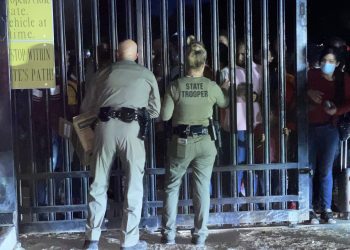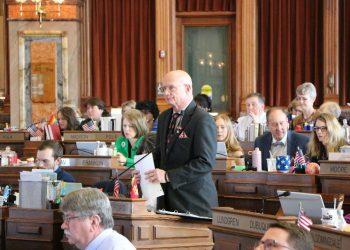DES MOINES, Iowa – Gov. Kim Reynolds signed HF 813, a bill that expands Iowa’s charter school law, at the Starts Right Here headquarters just south of downtown Des Moines.
“This historic legislation will bolster Iowa’s public education system by helping meet the needs of many by meeting the varying needs of all Iowa’s K-12 students. I can’t think of a more appropriate place to sign it into law than here at the headquarters of starts right here. That’s because Starts Right Here and its founder, my friend, Will Keeps, represents exactly the type of impactful community organization that can enrich our public education system in Iowa,” she said.
“A high-quality education system is the foundation of our state. And what many of our teachers and administrators did this last year was nothing short of amazing. But if there’s one thing that the pandemic taught us, it’s that parents should have the opportunity to choose what’s best for their children. Conventional public education may not work for all students. Not all kids are the same, and certainly not all of the circumstances they face,” Reynolds said. “For some families, charter schools can provide an innovative alternative learning model that motivates students to succeed and allows greater flexibility for districts and schools to focus on closing gaps in student opportunity and achievement for all students from preschool through postsecondary preparation.”
Starts Right Here serves “at-risk” students in grades K-12 in Des Moines, 70 percent of whom are minorities. They work toward a long-term goal of creating a pool of workers who are “educated, equipped, and empowered to build successful lives.”
Will Keeps, a Des Moines area hip hop artist and the organization’s founder, expressed his organization’s intent to apply to create a charter school with the Iowa State Board of Education.
“When it comes down to building a charter school. I want us to become a family. I want us to be able to help these kids in so many different ways. I want to be able to help them with the outside world. So they can focus on their education because a lot of kids are going through a lot of issues outside of education. And they don’t focus. So I want to be able to help them with that as well. I want to be able to cut through that red tape and make sure they get everything they need to be successful,” he said.
Starts Right Here helped serve kids in the Des Moines Public School District who were falling through the cracks during the pandemic while the DMPS just provided online education. Keeps also challenged opponents of the charter school bill.
“This charter school bill is about is to give these kids another option. What’s wrong with that? What’s wrong with when making sure these kids have another choice to be successful? What’s wrong with that? And we should all fight for that. No political reasons, but if it’s about the kids, let’s make (the) focus about the kids, period,” he said.
Iowa’s original charter school law only allowed schools to obtain charters through the approval and oversight of local school districts, providing another public education option for parents. Charter schools now can only operate within the boundaries of the school district. There are only two authorized charter schools in the state, both high schools, one in Storm Lake and the other in Maynard.
The existing charter schools will continue to operate under the current code, but no new charter school can start under that chapter if the bill becomes law. HF 813 creates a new code chapter with two charter school models – the school board – state board model and the founding group – state board model.
The state board of education can approve charter school requests from founding groups created by local school districts who would operate a charter school within and as part of a school district as a new attendance center, part of an existing attendance center, or by converting an existing attendance center.
HF 813 also allows the state board of education to approve charter schools established by independent founding groups that create a charter school within the state’s boundaries that operates as a new attendance center independently from a public school district. The charter school would be overseen by a governing board, either elected or selected, based on the charter school’s contract with the state.
The governing board would be required to have a majority of members from the charter school’s geographical area. Those members not from the geographical area must be residents of Iowa. Governing board meetings would fall under the open meetings law, and the budget would be required to be made public.
The bill requires the Iowa Department of Education to monitor charter schools’ progress and establishes application and approval criteria for the state board of education to implement. Charter school contracts can be granted for five-year terms.
What makes charter schools unique is that they are exempt from all state statutes and rules and any local rule, regulation, or policy applicable to non-charter schools except for health and safety regulations and laws, nondiscrimination laws, they must be non-sectarian and non-religious, tuition-free, provide special education services, audit requirements, and transportation requirements.
Charter schools are also required to follow assessment and academic standards requirements under Iowa Code unless the state board of education provides a waiver in their application process. Charter schools under this bill must hire licensed teachers with the appropriate endorsements in the subjects they will teach.
The state board of education can also revoke a charter school charter if it fails to meet its contractual obligations, and the state board of education can deny a renewal request.
Each student enrolled in a charter school established under the bill is counted, for state school foundation purposes, in the student’s district of residence. Those districts are then responsible for paying the charter school an amount equal to the state cost per pupil during the previous school year, and the teacher leadership supplement state cost per pupil. There are additional funds required if a student is a non-English speaker or if a student is eligible for a postsecondary enrollment options program. One exception would be the first year that a former homeschool or private school student attends a charter school. In those cases, the state would pay.















